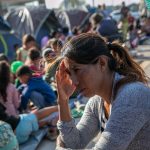In early March, we traveled to the southern border in Texas to document how U.S. policies have trapped asylum seekers and other migrants in unsafe cities in Mexico. As an attorney and a physician who defend the right to asylum with Physicians for Human Rights (PHR), we are deeply concerned about how the rapid spread of COVID-19 will exponentially add to the dangers – including robbery, abduction, and human trafficking – that migrants already face there.
Since January 2019, the Trump administration has returned some 60,000 asylum seekers to Mexico under the so-called Migrant Protection Protocols (MPP). MPP requires them to wait for months in border towns that are deemed among the world’s most dangerous while their cases crawl through U.S. immigration courts.
In Texas, we witnessed the cruelty that these policies have inflicted on some of the region’s most persecuted people. We watched Maria* (name changed to protect her from reprisals), a Venezuelan woman seeking asylum, break down in tears on a video screen in a San Antonio immigration court after the judge informed her that her next asylum hearing was more than four months away. Maria participated in the proceedings from a tent facility at the border, approximately 150 miles from the court. At risk of kidnapping and extortion by cartels in Mexico, Maria pleaded in vain for an earlier court date. She and the other asylum seekers in that tent court would instead cross the bridge back to Nuevo Laredo, Mexico after the day’s hearings.
Maria’s perception of the risks on the Mexican side of the border were no exaggeration. Over the past 14 months, there have been public reports of more than 1,000 asylum seekers returned to Mexico under MPP who were victims of “murder, rape, torture, kidnapping, and other violent assaults.” Asylum seekers waiting along the border also have very little health care infrastructure to support them.
In similar hearings in San Antonio and Brownsville, we witnessed women, men, and children from across Latin America subjected to similarly inhumane bureaucratic disregard for the urgency of their asylum claims. One morning, when the judge asked all 30 assembled asylum seekers to raise their hands if they were afraid to go back to Mexico, 25 hands shot up.
If and when COVID-19 rips through asylum seekers’ encampments and shelters, those who contract the virus have little hope of accessing adequate care in Mexico.
U.S. asylum seekers’ perilous, months-long wait in Mexico has now become potentially indefinite. The Trump administration has used the threat of COVID-19 to suspend MPP legal proceedings through at least May 1 and to close the border to all new asylum seekers, despite the fact that novel coronavirus infection rates are far higher in the United States than in Mexico. Nonetheless, the new policy contains a built-in transmission risk for asylum seekers in MPP. They are required to present at ports of entry on their previously scheduled hearing dates to receive new hearing dates, which means they must interact with Border Patrol personnel who could be carriers of the virus. They face expulsion from MPP if they fail to show up.
Courts should absolutely be closed to prevent spread of infection. But doing so without offering migrants the opportunity to seek asylum at the border and to wait for their court dates in the United States is not only cruel, it is potentially lethal, as it exposes them both to the risks of violent crime and to a possible COVID-19 outbreak in crowded migrant encampments or shelters along the Mexican side of the border. The director of the U.S. Centers for Disease Control (CDC) himself stated that a COVID-19 outbreak among MPP participants is “inevitable” under current conditions.
If and when COVID-19 rips through asylum seekers’ encampments and shelters, those who contract the virus have little hope of accessing adequate care in Mexico. Matamoros – a city of more than half a million that hosts a migrant population of 3,000 in just one camp – has only 25 ventilators and 11 critical care beds. Matamoros public health officials warn that a widespread COVID-19 outbreak in that camp would “collapse” the city’s health system.
These grave risks are a direct result of U.S. policies that are as callous as they are unnecessary.
These grave risks are a direct result of U.S. policies that are as callous as they are unnecessary. An estimated 92 percent of migrants trapped on the Mexican side of the border have family members or close friends in the United States with whom they could quarantine safely. Community-based alternatives to detention have extremely high rates of compliance and much better health outcomes.
The United States is obligated under both international and domestic law to honor the right to seek asylum. The U.S. government should conduct initial health screenings of asylum seekers at ports of entry and then release them to their families in the United States, through parole or other community-based alternatives to detention. History will judge the United States harshly if the country closes its doors to asylum seekers now.

